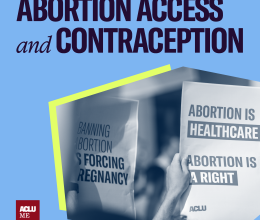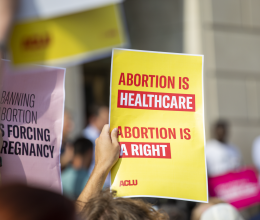Hello readers! As the new Reproductive Freedom Organizer at the ACLU of Maine, I am excited to begin working to ensure that all Maine women are able to maintain control over their reproductive rights and choices.
The past year has been a whirlwind of successes and losses around women’s reproductive rights. In almost every legislative session in every state, women’s reproductive rights have been up for debate. In 2013 alone, over 300 abortion restrictions were introduced in state legislative sessions. Some states, such as North Dakota, Wisconsin, Texas, and North Carolina (to name a few), saw legislation passed that instated longer waiting periods, more complex consent rules, and unnecessary medical and counseling procedures prior to obtaining an abortion. Other states, such as Pennsylvania, Michigan, Virginia, and Arkansas, passed legislation restricting private insurance coverage for abortion procedures. For more state-by-state detail on what’s transpired in 2013, check out the interactive map for the ACLU’s “States Where They Think We’re Stupid” campaign. For a comprehensive overview of state abortion policies, check out the Guttmacher Institute’s “State Policies in Brief.”
Here in Maine, our first legislative session of 2013 brought several pro-choice victories as pro-choice legislators and members of the Maine Choice Coalition defeated three anti-choice bills. LD 760 would have required doctors to follow an unecessary, coercive script with any woman seeking an abortion. LD 1339 would have replaced Maine's succesful adult consent law with one requiring that a minor get signed consent from a parent before obtaining an abortion - ignoring that fact that doing so is not a possibility for some young women. Finally, LD 1193, “An Act To Allow a Wrongful Death Cause of Action for the Death of An Unborn Child,” sought to establish legal rights for a fetus by setting viability at 12 weeks (rather than the Roe v. Wade defined 24 weeks) and to create a separate “personhood” status for fetuses. If you'd like to read a quick summary of what happened with these bills during the legislative session, you can check out this BDN article from May 2013.
January 2014 marks the implementation of the Affordable Care Act of 2010. While reproductive issues come up for debate on a regular basis, the implementation of the ACA recharges conversations about what types of women’s health care should/should not be permissible using federal dollars. This debate has paved the way for erosive legislation limiting women’s access to abortion care across the US.
In general, the ACA maintains the status quo put into place since the Hyde Amendment (1973), which barred the use of federal funds to pay for most abortions. The Stupak-Pitts amendment, introduced in 2009, codified the Hyde Amendment in light of the ACA, stipulating that funds from the ACA could not be used to “cover any part of the costs of any health plan that includes abortion.” This leaves states open to consider (or reconsider) the use of state Medicaid funds to cover abortion services. Many states have spent 2013 playing defense, attempting to thwart tightening restrictions on health care coverage for women. Other states, like Washington and Oregon, have been working to preserve the state funding they’ve had allotted for low-income women.
Conversations about contraception coverage have also been renewed in light of the ACA. As part of the act, the federal government has ruled that health care plans must require contraception without a co-pay. As of today, 88 cases have been filed challenging this rule as an infringement on religious liberty. Many of the cases have been brought by religious businesses and organizations. Two challenges – one from Hobby Lobby, the other from a Pennsylvania furniture store, Conestoga – will be tried in the Supreme Court. You can read more about these court cases (and others) here.
But if all this sounds a bit bleak, it hasn’t been all about defeat. While it’s important to keep track of the attacks, it’s equally as important to celebrate the victories like those in Maine. It’s been heartening to see strong and consistent pro-choice organizing taking place across the country this year, many of which you can read about here. Across the country, advocates demonstrated that Americans are adamant about a women’s right to privacy and her right to make her own reproductive decisions.
Here in Maine, we’re hoping to keep the victories coming in 2014. We'll remain vigilant for anti-choice legislation that seeks to limit women's access to health care, and we'll continue working to make sure that all women have access to the abortion care that they need.









